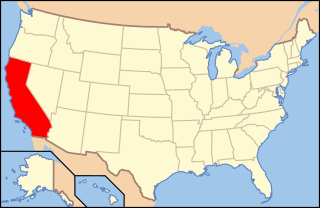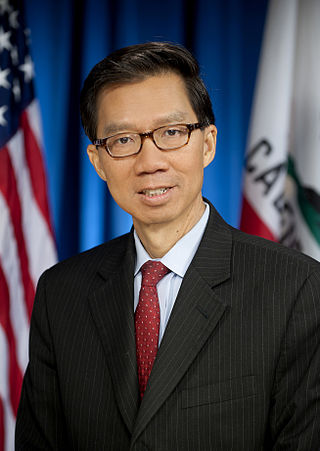Gender neutrality, also known as gender-neutralism or the gender neutrality movement, is the idea that policies, language, and other social institutions should avoid distinguishing roles according to people's sex or gender. This is in order to avoid discrimination arising from the impression that there are social roles for which one gender is more suited than another. The disparity in gender equality throughout history has had a significant impact on many aspects of society, including marketing, toys, education and parenting techniques. In order to increase gender neutrality in recent years, there has been a societal emphasis on utilizing inclusive language and advocating for equality.

Gavin Christopher Newsom is an American politician and businessman serving as the 40th governor of California since 2019. A member of the Democratic Party, he served from 2011 to 2019 as the 49th lieutenant governor of California and from 2004 to 2011 as the 42nd mayor of San Francisco.

Fiona Ma is an American politician and accountant. She has been serving as the California state treasurer since January 7, 2019. She previously was a member of the California Board of Equalization (2015–2019), the California State Assembly (2006–2012), and the San Francisco Board of Supervisors (2002–2006).

Nancy Skinner is an American politician who served as a member of the California State Senate from 2016 to 2024. A Democrat, she represented California's 9th State Senatorial district, encompassing parts of the East Bay.

Evan Low is an American politician who served in the California State Assembly from 2014 to 2024. A member of the Democratic Party, he represented the 26th Assembly district, which encompasses parts of Silicon Valley, including Cupertino, Sunnyvale, Santa Clara and portions of northern and western San Jose. He was a member of the California Legislative LGBT Caucus, and served as Chair of the California Asian American & Pacific Islander Legislative Caucus.

Philip Yu-Li Ting is an American politician who served in the California State Assembly from 2012 to 2024. He is a Democrat who represented the 19th Assembly District, which encompasses western San Francisco and northwestern San Mateo County. Prior to being elected to the Assembly, he was the Assessor-Recorder of San Francisco.

California is seen as one of the most liberal states in the U.S. in regard to lesbian, gay, bisexual, transgender, and queer (LGBTQ) rights, which have received nationwide recognition since the 1970s. Same-sex sexual activity has been legal in the state since 1976. Discrimination protections regarding sexual orientation and gender identity or expression were adopted statewide in 2003. Transgender people are also permitted to change their legal gender on official documents without any medical interventions, and mental health providers are prohibited from engaging in conversion therapy on minors.

Scott Wiener is an American politician who has served in the California State Senate since 2016. A Democrat, he represents the 11th district, encompassing San Francisco and parts of San Mateo County. He is also the co-chair of the California Legislative Jewish Caucus.

Robert Andres Bonta is a Filipino-born American lawyer and politician serving as the attorney general of California since 2021. A member of the Democratic Party, he previously served as a member of the California State Assembly for the 18th district from 2012 to 2021 and as a member of the Alameda City Council from 2010 to 2012.

Edwin “Ed” Chau is an American jurist and politician who served in the California State Assembly as a Democrat representing the 49th state assembly District from 2012 to 2021. On November 29, 2021, California Governor Gavin Newsom appointed Chau to be a judge in the Los Angeles County Superior Court.

Proposition 47, also known by its ballot title Criminal Sentences. Misdemeanor Penalties. Initiative Statute, was a referendum passed by voters in the state of California on November 4, 2014. The measure was also referred to by its supporters as the Safe Neighborhoods and Schools Act. It recategorized some nonviolent offenses as misdemeanors rather than felonies, as they had previously been categorized.

Let Toys Be Toys is a campaign designed to persuade retailers to stop categorising toys by gender. It was started by a group of parents on the parenting on-line discussion forum Mumsnet.

Christopher Ward is an American politician serving as a member of the California Assembly for the 78th district. Prior to his election to the assembly, Ward served as a member of the San Diego City Council, representing the Third Council District. He is a Democrat.

Rebecca Beth Bauer-Kahan is an American attorney and politician who has served as a member of the California State Assembly from the 16th district since 2018. A member of the Democratic Party, her district extends from Lamorinda to the Tri-Valley region of the San Francisco Bay Area. She has been described as a women's rights advocate.

The 2021–2022 session is the most recent former session of the California State Legislature. The session first convened on December 7, 2020 and ended November 30, 2022.

The 2022 California Insurance Commissioner election was held on November 8, 2022, to elect the Insurance Commissioner of California. Under California's nonpartisan blanket primary law, all candidates appeared on the same ballot, regardless of party. In the primary, voters may vote for any candidate, regardless of their party affiliation. The top two finishers — regardless of party — advanced to the general election in November, even if a candidate managed to receive a majority of the votes cast in the primary election. Incumbent Democratic Insurance Commissioner Ricardo Lara won re-election to a second term.
The right to sit in the United States refers to state and local laws and regulations guaranteeing workers the right to sit at work when standing is not necessary. The right to sit was a pillar of the early labor movement. Between 1881 and 1917, almost all states, the District of Columbia, and Puerto Rico had passed legislation concerning suitable seating for workers. These laws were enacted during the Progressive Era, spearheaded by women workers in the labor movement.

Lori Denise Wilson is an American politician elected to the California State Assembly. She is a Democrat elected to represent the 11th district, encompassing Solano County and parts of Contra Costa County, including the city of Oakley, and Sacramento County. Prior to being elected to the state assembly, she was mayor of Suisun City.
Theyby and non-binary baby are neologisms for a baby or child raised in a way that is gender-neutral, allowing children to explore their own gender and expression on their own terms, and also referring to the accompanying parenting style. The terms and movement were initially popularized in 2018, preceding several reports of babies in 2017 being born without being assigned a gender. The practice of raising babies as gender neutral has been reported as early as 2009 and 2011. The term theyby, however, was first used in 2017. The term is a blend of the pronoun 'they' and 'baby'. Until children raised as theybies figure out their gender and pronouns, they are referred to by the parents using they/them pronouns.
The California Social Housing Act is a proposed California bill to establish an independent statewide housing authority, known as the California Housing Authority, to acquire land for, develop, own and maintain public housing. The bill is authored by Alex Lee and was first introduced to the 2021–2022 session of the California State Legislature. In the 2023–24 session, the bill was passed by the legislature, but was vetoed by Governor Gavin Newsom on budgetary grounds. Lee re-introduced the bill in the 2025–26 session.
















